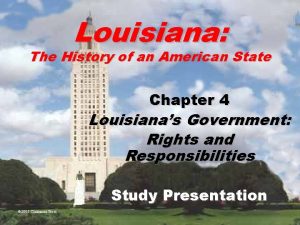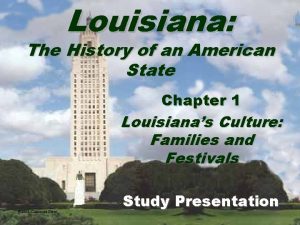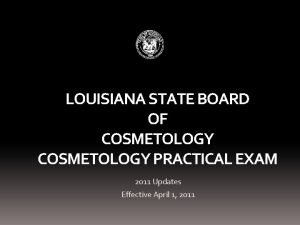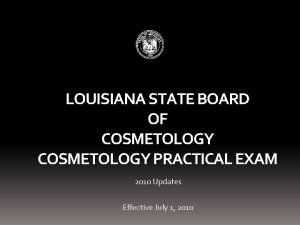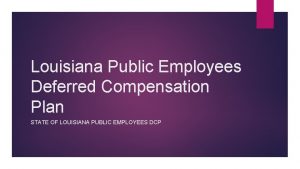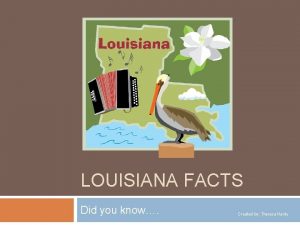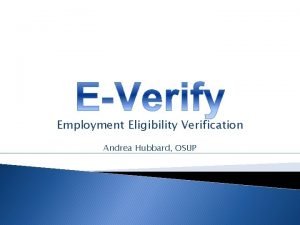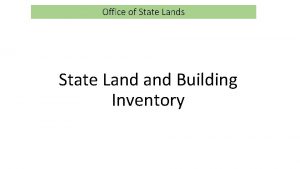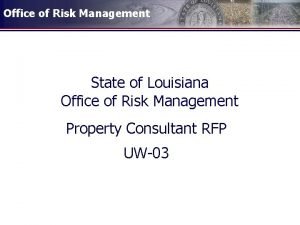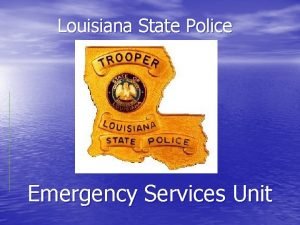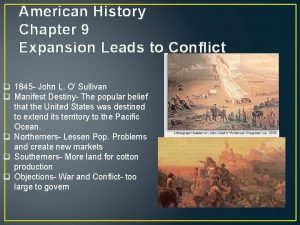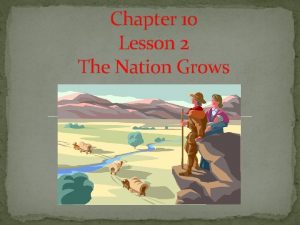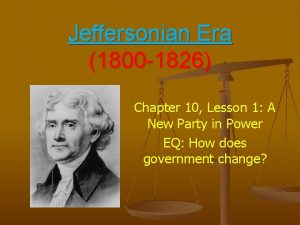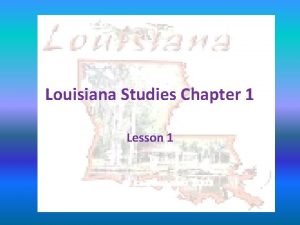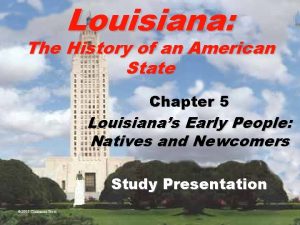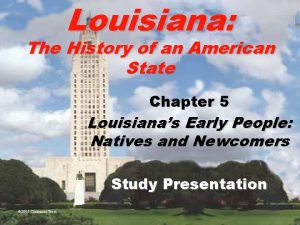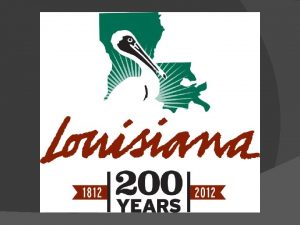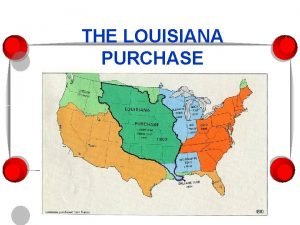Louisiana The History of an American State Chapter
















































- Slides: 48

Louisiana: The History of an American State Chapter 4 Louisiana’s Government: Rights and Responsibilities Study Presentation © 2005 Clairmont Press

Chapter 4: Louisiana’s Government: Rights and Responsibilities Section 1: Democratic Government Section 2: Structure of State Government Section 3: Local Governments Section 4: Citizens and Government

Section 1: Democratic Government ESSENTIAL QUESTION: – How does Louisiana’s constitution set out a plan for organizing the government?

Section 1: Democratic Government What words do I need to know? 1. government 2. parish 3. constitution 4. federalism

The History of Louisiana Government • Influenced by its colonial founders • Spanish: parishes (geographical divisions of the Catholic church) • French & Spanish government influences: civil laws based on civil codes

The History of Louisiana Government • Also based on British common law system • common law (follows precedents) • civil law (uses a written code) • criminal law (protects society from criminals)

Foundations of Government • People given authority to write a state constitution prior to statehood • April 30, 1812: Louisiana 18 th state to enter the Union • Constitutional government • State powers derived via US Constitution, describing specific state and local responsibilities

The United States Constitution • Reflects government by the citizens: “We the People” (1 st phrase in Preamble) • Identifies purpose, organization, & purpose of government • Establishes division of power (federalism) • Article 4: U. S. Constitution – Discusses shared relationship between state & federal governments – Indicates powers belonging to the state • Bill of Rights (Tenth Amendment)

The State Constitution • Provides a framework for the state government • Acts in the interest of the people • Protects the rights of citizens • State bill of rights stronger than the US Bill of Rights – non-discrimination laws stronger & more detailed and specific • Louisiana history includes 11 constitutions Click here to return to Main Menu.

Section 2: Structure of State Government ESSENTIAL QUESTION: – How does Louisiana’s government operate?

Section 2: Structure of State Government Executive Branch • Governor • Lieutenant Governor • Attorney General • Secretary of State • Treasurer • Other Elected Officials Legislative Branch • State Legislators • Legislative Sessions • Law Making Judicial Branch § Civil and Criminal Law § Louisiana’s Court System § Juries Funding State Government § The State Budget § Taxes § Other Sources of Revenue

Section 2: Structure of State Government What words do I need to know? 1. checks & balances 2. veto 3. executive branch 4. governor 5. budget 6. lieutenant governor 7. attorney general 8. secretary of state 9. treasurer 10. legislative branch 11. bicameral 12. census (Continued)

Section 2: Structure of State Government 13. reapportionment 14. speaker of the house 15. president of the senate 16. constituent 17. bill 18. judicial branch 19. civil law 20. criminal law 21. jury 22. taxes

Section 2: Structure of State Government • Louisiana’s constitution: – Patterned after US Constitution – Three branches of government – Power divided • Checks and balances • veto: refuse to approve

Executive Branch • • • Implements the laws Operates state government Oversees state services Governor – chief executive officer Other elected officials include – lieutenant governor, secretary of state, treasurer, attorney general, commissioner of agriculture and forestry, & commissioner of insurance

Governor • Must be at least 25 • Duties: prepares & years old submits a budget to the legislature • A citizen of the US & Louisiana at • Appoints citizens to least five years boards & commissions • Elected for a fouryear term • Calls special sessions of the • Can serve two legislature back-to-back terms

Lieutenant Governor • Serves as a public relations office for the state • Heads the State Department of Culture, Recreation and Tourism • Somewhat like being vice president of the United States • Acts as or replaces governor if needed

Attorney General • Heads the state’s • Can bring legal office, the action on behalf of Department of the state Justice • 1990 s – Louisiana joins other states’ • Provides opinions actions to sue on questions of law tobacco companies to all state agencies & other • Defends Louisiana government groups laws if challenged

Secretary of State • Chief election officer for Louisiana • Sole supervision duties of state held elections • Keeps official records • Publishes the acts and journals of the legislature • Keeper of the Great Seal of the state

Treasurer • Elected head of the Department of the Treasury • In charge of the state’s money • Keeps records of the state’s income and expenses • Invests state monies not needed • Provides the governor and the legislature a yearly financial report

Other Elected Officials • Commissioner of Agriculture – Promotes agriculture & forestry – Oversees soil & water conservation • Commissioner of Insurance – Enforces insurance laws passed by the legislature • The Board of Elementary and Secondary Education (BESE) – Supervises education – Appoints the state superintendent of education – Three members of the board governor appointees

Legislative Branch • • Consists of two bodies: (1) house of representatives (2) senate Based on model called bicameral (two chambers): camera - Latin word for “chamber” Contains 144 members (39 Senators / 105 Representatives) elected from geographic districts New districts redrawn every 10 years based on US census and new population numbers (reapportionment)

State Legislators • Old enough to vote (18 years old) old enough to be elected • Candidate must be a registered voter • A resident of the state at least 2 years • One year resident of the district • Elected for two-year term • Maximum of three terms (total of 12 years)

Legislative Sessions • Meets every year • Even-numbered years: meets 30 days during a 45 -day period • Tax bills: can only be passed in evennumbered years • Odd-numbered years: meets 60 days during an 85 -day period • Speaker of the House: resides over the House of Representatives • President of the Senate: resides over the Senate • constituents: people legislators represent

Law Making • Writes and approves laws • Proposed laws (bills) in either chamber • A bill becomes law: – Approved by both the house & senate – Signed by the governor

Judicial Branch • Interprets & applies the constitution and laws of the state • Protects the rights of the citizens – life, liberty, or property – exception: by due process of law • Rules established by courts

Civil and Criminal Law • Laws divided into two categories • Civil laws: relationships between & among individuals • Elected & appointed officials • Laws enforced by sheriffs, police, & city marshals • District attorneys: prosecutes criminal cases in district courts • Clerks of court: keeps official records for a parish

Louisiana’s Court System • Three levels • District courts, courts of appeal, & the Louisiana supreme court • District courts (main trial courts) • Hears both civil & criminal cases • Court of appeals (2 nd step in the judicial process) • to appeal – take a case to a higher court for rehearing • Louisiana state supreme court (hears appeals from lower-level courts) • Always reviews case in which defendant has been sentenced to death

Juries • Three reason for going to court • as a witness • as a participant in a civil lawsuit • as a person charged with a crime • jury duty – when a citizen serves on a jury • Grand jury • 12 citizens serve for six months • 1 st step against accused criminal • Decision to indict a person • Regular trial hears evidence and rules on the defendant’s innocence or guilt

Funding State Government • State needs money to function • Budget requires detailed planning from state government to meet needs of its people

The State Budget • Budget requires plan of receiving & spending money • Revenue estimate each year • How much? • How to spend? • Budget from governor • Includes revenue & expenditure • Balanced budget state constitutional requirement

Taxes • Taxes: federal, state, and local monies collected from citizens that help provide government services • Sales tax: charges on items purchased (largest single source of tax revenue) • Excise tax: charges on gasoline, alcohol, soft drinks, and cigarettes • Severance tax: charge for removing natural resources • Income tax: based on salary/income • Property tax: on homes and land • Homestead exemption tax: based on value of a home according to the exemption scale • Taxes on vehicles

Other Sources of Revenue • Additional tax revenue • Fees from drivers’ licenses • Fees from business licenses • Interest from state investments • Money earned from oil & gas royalties • Royalties from stateowned lands • Hundreds of millions of $ paid to state in settlements • Monies received from the 8 g fund • The Millennium Trust Fund • of budget received from the federal government • Borrowing money by selling bonds to investors • Gaming (legal term for gambling) Click here to return to Main Menu.

Section 3: Local Governments ESSENTIAL QUESTION: – What are the types of local governments?

Section 3: Local Governments - What words do I need to know? 1. police jury 2. home rule 3. municipality

Parish Government • Primary local government division • System of 64 parishes since 1912 • Parish government & courthouse located in town or city known as the parish seat • 1 st set up as church divisions during Spanish colonial Louisiana

Police Jury • Citizens chosen to supervise (or police the parish) • Group referred to as a jury • 46 (out of 64) parishes still the same • 5 – 15 elected members • Passes local laws for the parish • Responsible for building and maintaining parish roads & buildings

Police Jury • Authority to raise money for expenses • Appoints parish registrar of voters & the treasurer, tax collector, sheriff, district attorney, clerk of the court • Create special districts • Report only to the voters

Other Parish Government Plans • Local governments have more power through Louisiana’s current constitution • home rule: power of political subdivisions to govern themselves • home rule charter: community can organize local government in a form other than police jury • combined government: city and parish government in one body

School Boards • • Same political boundaries as the parishes Exceptions: City districts of Baker, Bogalusa, Monroe, and Zachary Board members elected based on population Four-year terms for members Not a part of parish government Closely regulated by the state School operating monies come from the state and from local taxes and bonds Board appointed superintendent in each local system

Municipalities • Political boundaries • Cities and towns • villages: smallest municipalities (population from 150 to 999) • town: larger municipalities (when the population reaches 1, 000) • city: 5000+ population • A mayor & a council (or a group of commissioners): elected by each local group Click here to return to Main Menu.

Section 4: Citizens and Government ESSENTIAL QUESTION: – What are the rights and responsibilities of citizens?

Section 4: Citizens and Government What words do I need to know? 1. open primary 2. lobbying 3. civic

Voting and Elections • 26 th amendment (1971): US constitution changes right to vote from 21 to 18 • Must live in parish to register in that parish • register at registrar of voters’ office, by mail, or at the Office of Motor Vehicles • Voter not limited to one party • runoff election: when two candidates receive the most votes – either from the same party or different political parties

Political Parties • Organizations of people having similar ideas about how government should be operated • 1 st parties: formed around Thomas Jefferson & Alexander Hamilton • Major political parties: Republican Party & Democratic Party • In Louisiana, more registered Democrats • Vote more by factions • factions: groups of voters with a common interest – includes Catholics, Protestants, Acadians, & African Americans, etc.

Campaigns • Candidates: campaign to win votes • Methods of campaigning – Traditionally: Spoke directly to the people – More recently: television, radio & newspaper ads • Hiring of political consultants • Fund-raising now essential • Campaign financing limited by law • Disclosure required of amount of money contributed and contributor

Lobbying • Efforts made to influence a legislator • Lobbyist not limited to a special group, person, or persons • Lobbying: done through letters and visits to the Capital • Some lobbyists volunteer, others paid • MADD (Mothers Against Drunk Driving): example of a lobbying group • Methods of lobbyist limited – example: using money to buy influence prohibited • Lobbying at State & National levels often affects the law makers final decisions Click here to return to Main Menu.

Click here to return to Main Menu.
 Louisiana the history of an american state
Louisiana the history of an american state Louisiana the history of an american state
Louisiana the history of an american state Louisiana cultural regions
Louisiana cultural regions Louisiana state board esthetician practical exam
Louisiana state board esthetician practical exam Louisiana cosmetology license
Louisiana cosmetology license Louisiana employees deferred compensation plan
Louisiana employees deferred compensation plan Louisiana state tree
Louisiana state tree E verify enrollment checklist
E verify enrollment checklist Cavallino
Cavallino Louisiana office of state lands
Louisiana office of state lands Louisiana office of risk management
Louisiana office of risk management Biomedical engineering la tech curriculum
Biomedical engineering la tech curriculum Louisiana tier ii reporting
Louisiana tier ii reporting State of louisiana doa
State of louisiana doa Chapter 4 foundations background to american history
Chapter 4 foundations background to american history Chapter 10 section 2 the history of american banking
Chapter 10 section 2 the history of american banking American history chapter 9
American history chapter 9 Chapter 10 lesson 2 the louisiana purchase
Chapter 10 lesson 2 the louisiana purchase Chapter 10 lesson 1 a new party in power
Chapter 10 lesson 1 a new party in power Hình ảnh bộ gõ cơ thể búng tay
Hình ảnh bộ gõ cơ thể búng tay Ng-html
Ng-html Bổ thể
Bổ thể Tỉ lệ cơ thể trẻ em
Tỉ lệ cơ thể trẻ em Gấu đi như thế nào
Gấu đi như thế nào Tư thế worm breton là gì
Tư thế worm breton là gì Alleluia hat len nguoi oi
Alleluia hat len nguoi oi Môn thể thao bắt đầu bằng chữ đua
Môn thể thao bắt đầu bằng chữ đua Thế nào là hệ số cao nhất
Thế nào là hệ số cao nhất Các châu lục và đại dương trên thế giới
Các châu lục và đại dương trên thế giới Công của trọng lực
Công của trọng lực Trời xanh đây là của chúng ta thể thơ
Trời xanh đây là của chúng ta thể thơ Mật thư tọa độ 5x5
Mật thư tọa độ 5x5 Làm thế nào để 102-1=99
Làm thế nào để 102-1=99 độ dài liên kết
độ dài liên kết Các châu lục và đại dương trên thế giới
Các châu lục và đại dương trên thế giới Thơ thất ngôn tứ tuyệt đường luật
Thơ thất ngôn tứ tuyệt đường luật Quá trình desamine hóa có thể tạo ra
Quá trình desamine hóa có thể tạo ra Một số thể thơ truyền thống
Một số thể thơ truyền thống Cái miệng nó xinh thế chỉ nói điều hay thôi
Cái miệng nó xinh thế chỉ nói điều hay thôi Vẽ hình chiếu vuông góc của vật thể sau
Vẽ hình chiếu vuông góc của vật thể sau Biện pháp chống mỏi cơ
Biện pháp chống mỏi cơ đặc điểm cơ thể của người tối cổ
đặc điểm cơ thể của người tối cổ Thế nào là giọng cùng tên
Thế nào là giọng cùng tên Vẽ hình chiếu đứng bằng cạnh của vật thể
Vẽ hình chiếu đứng bằng cạnh của vật thể Tia chieu sa te
Tia chieu sa te Thẻ vin
Thẻ vin đại từ thay thế
đại từ thay thế điện thế nghỉ
điện thế nghỉ Tư thế ngồi viết
Tư thế ngồi viết

